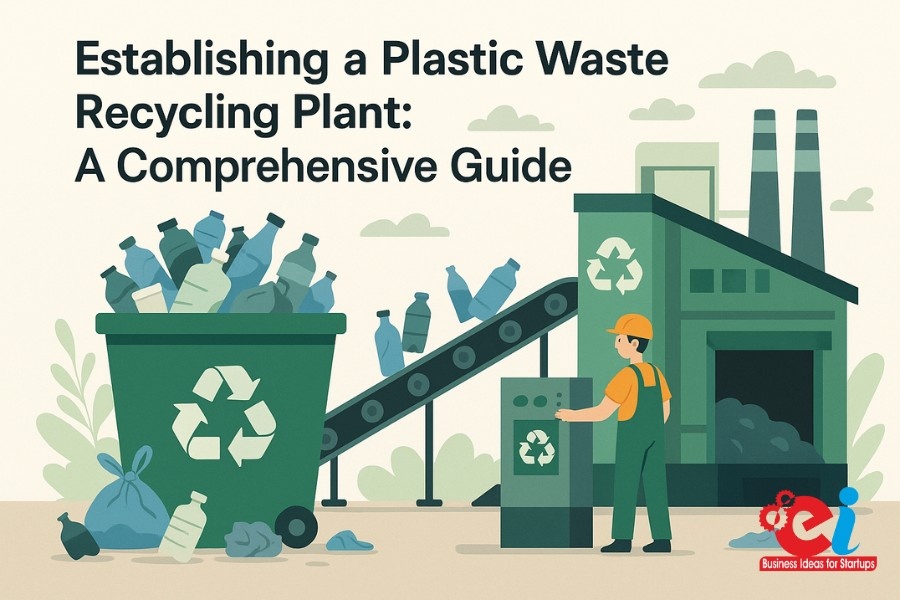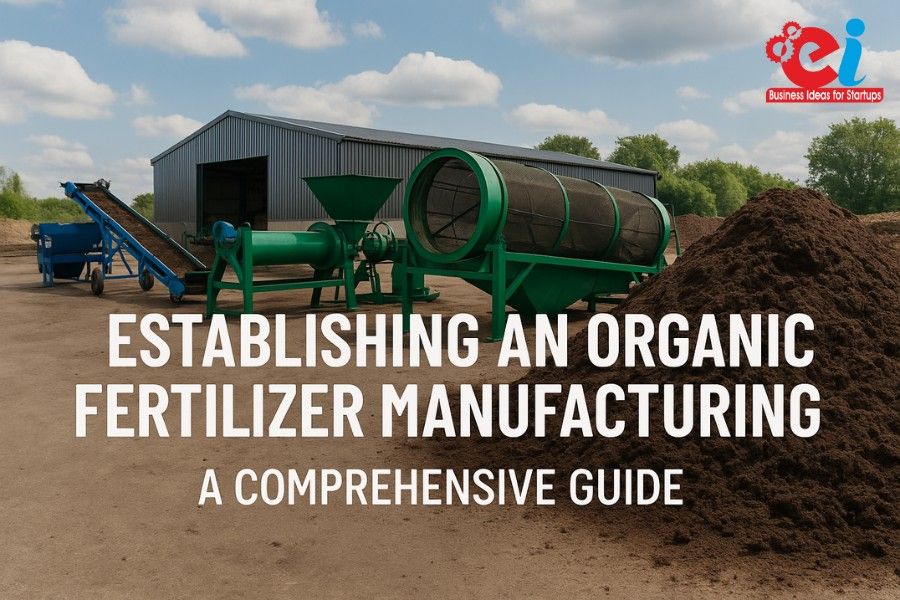India single-handedly contributes over 3.5 million tons of plastic waste yearly, much of which is unmanaged and causes harm to the environment. This is a byproduct of the increase in consumerism around the globe, leading to a global plastic waste crisis. With the rise in advanced business models, Plastic Waste Recycling Plant is emerging as a highly profitable venture for those wishing to make a difference. With growing environmental awareness, recycling stands out as a sustainable and scalable solution.
Emerging techniques in construction, packaging, automotive, textiles and more have led to the industry shifting to more environmentally friendly practices. Setting up a Plastic Waste Recycling Plant tackles the environmental problem while also serving as a profitable industrial venture. This guide serves all aspiring entrepreneurs looking to start their plastic recycling plants in India. NPCS provides aid on all levels of setting up a Plastic Waste Recycling Plant from acquiring necessary permits to machinery licenses.
1. Why Invest in a Plastic Waste Recycling Plant?
Economic Impact
Recycling one ton of plastic saves up to 5774 kWh of energy and provides a significantly lower carbon footprint making it an economically sound decision. Supply chains and industries that need automobile parts are eager to cooperate and purchase for their business further boosting the economy.
Government Support
Indian legislation encourages EPR (Extended Producer Responsibility) and sets laws to regulate it, proactively driving attention toward plastic pollution through various schemes and incentives such as the Plastic Waste Management Rules, 2016.
Creating bans on single-use plastics increases the demand for units that specialize in recycling.
Also, there are incentives provided for MSME and for startups which come under the umbrella of Make in India as well as Startup India schemes.
Business Prospect
The worth of the Plastic Waste Recycling Plant sector in India is estimated to be around ₹25,000 crores, with an annual growth rate of 6–8%.
Selling of recycled granules of plastics, flakes of plastics and even reprocessed components made of plastic can be exported to regions such as Asia, Africa and the Middle East.
2. Categories of Plastic Waste along with their Recycling Methods
| Plastic Type | Examples | Method of Recycling |
| PET (Type 1) | Bottles, jars | Flaking, washing, extrusion |
| HDPE (Type 2) | Milk jugs, shampoo bottles | Granulation |
| LDPE (Type 4) | Carry bags, wrappers | Agglomeration + extrusion |
| PP (Type 5) | Furniture, containers | Washing, melting, molding |
| PS (Type 6) | Disposable cups, packaging | Shredding, heating |
| Mixed/MLP (Type 7) | Chips packets, multilayer packaging | Pyrolysis or co-processing |
Related: Recycling Municipal, Agricultural, and Industrial Waste into Energy, Fertilizers, Food, and Construction Materials
3. Selecting an Appropriate Business Model
Model A: Sorting and Selling Plastic Waste
- Manual or semi-automatic segregation
- Cleared flake secondary raw material selling to Plastic Waste Recycling Plant
Model B: Plastic Flake Granules Reprocessing
- Washing, drying, extrusion, and pelletizing required
- Used by injection molders and film manufacturers
Model C: Manufacturing Products from Recycled Plastics
- Tiles, crates, sheets, and pipes, along with mix for road construction
- Additional and value-adding revenue. This model has relatively high margins.
Model D: For Mixed Plastics Pyrolysis Units
- Plastic is converted to fuel oil, gas, and char
- This model requires higher investment and stricter compliance
NPCS chooses based on budget, location, or available raw materials, based on helping entrepreneurs with selective business models to use.
4. Infrastructure, Land, and Location Requirements
Surface Land Requirements
| Daily Capacity | Plant Size | Land Needed |
| Small Scale | 2,000–3,000 sq. ft. | 500–1000 KG / DAY |
| Mid-sized Operations | 2–5 TPD | 10,000 sq. ft. |
| Large Scale | 10–20 TPD | 1–2 acres |
Ideal Locations
- Industrial areas with waste collection centers
- Close to municipal solid waste handling facilities
- High job availability areas that have lower land costs
Infrastructure
- Electric supply (Three-phase supply, 50–200 kVA)
- Water supply for washing use
- Sewage and Effluent treatment plants
- Storage areas for raw materials and finished goods
5. Other Licenses and Legal Requirements
Business Setup
- Company Registration (MSME/Udyam/Startup India)
- GST Registration
- Factory License
Environmental & Waste Management
- SPCB Grant of Consent to Authorize Establish and Operate (EAC)
- Authorization under Plastic Waste Management
- Fire Safety NOC
- EPR Registration on deformation of packaging plastics if applicable
Optional Certifications
- BIS certification for products made from recycled materials
- ISO 9001/14001 for quality/environmental management
NIIR Project Consultancy Services offers integral support in compliance documentation and obtaining clearances.
Related: Profitable Plastic Waste Recycling Plant Business Opportunity
6. Assembling the Necessary Technology and Equipment Aspects of the Project
| Machinery | Purpose | Estimated Cost (INR) |
| Conveyor Belt | Feeding plastic to crusher | ₹1–2 Lakhs |
| Shredder/Crusher | Plastic waste reduction to flakes | ₹3–5 Lakhs |
| Washing Unit | Elimination of dirt, label residues | ₹4–8 Lakhs |
| Drying System | Moisture removal from plastic flakes | ₹2–3 Lakhs |
| Agglomerator (for LDPE) | LDPE film to lumps conversion | ₹2–4 Lakhs |
| Extruder + Pelletizer | Plastic melting and granulation | ₹8–15 Lakhs |
| Cooling & Storage Systems | Collection and solidification | ₹1–3 Lakhs |
Total cost for semi-automatic setup: ₹25–35 Lakhs
NPCS project reports contain complete list of machinery, price quotation, and supplier information.
7. Plastic Waste Collection and Raw Material Sources
Sources of Plastic Waste
- Municipal waste from cities
- Waste collection centers and scrap retailers
- Packaging and production facilities
- Distribution and retail shops
- Coastal and river cleanups (CSR project)
Effective Collection Strategies
- Engage with waste collectors and self-help groups (SHGs)
- Encourage segregation at the household level
- Collaborate with schools and companies for CSR related procurement
- Participate with government’s Swachh Bharat scheme
8. Compliance – Environment and Safety of Workers
Pollution Prevention Policies
- Dust control devices and scrubbers are required
- ETP (Effluent Treatment Plant)
- Insulation of noise and excess heat of machines
- Ventilation open to filtration masks
Waste Treatment
- Non-recyclables shall be segregated
- Sludge/slurry residue must be disposed through authorized bodies
- Maintain waste utility sample records
9. Policies and Assistance with Funding
National Government Policies
- PRIME – Provides credit-linked subsidy to the value of ₹25 Lakhs
- ECLGS Policy – Provides emergency credit to guarantee funds
- NSIC – Granting support for MSMEs
- TUF Policy – For enabling conversion of plastic waste into textile fiber
Subsidies from Regional Authorities
- Subsidies for capital and interest
- Rebates to the value of electricity and water services
- Exemption from stamp duty and registration fees
NIIR Project Consultancy Services helps with funding requests, including preparing documents for the grant’s Detailed Project Report (DPR).
10. The Benefits of NPCS
For over two decades, NIIR Project Consultancy Services (NPCS) has been the go-to partner for almost any industrial unit setup in India. NPCS’s services for Plastic Waste Recycling Plant include:
- Customized Techno-Economic Feasibility Report consultancy (TEFR)
- Designing plant structure with input on machinery layout, production flow, and overall plant structure
- Planning and sourcing raw material supply chains
- Pollution clearance, EPR registration. Additional legal document support
- ROI Projection with financial modeling and required bank loan documentation
- Post-launch consulting and turn-key project execution
Conclusion
Plastic in the oceans and the ever-growing mountains of plastic waste around the world highlight the need to combat this problem while establishing a profitable business. With government support encouraging policy, alongside the growing need for products made from recycled plastic means that there is room in the market for innovative entrepreneurs.
NPCS has the ability to assist you in setting up an efficient business model that incorporates turning waste into wealth.
So what are you waiting for? Start recycling and start earning.

















